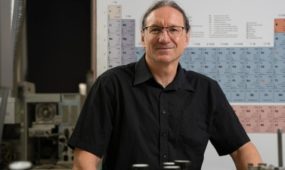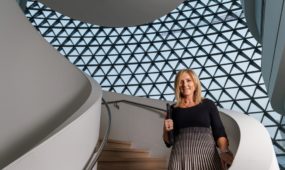The world is their oyster
Education
IT IS a Monday morning in Cowell, a small rural town on the east coast of South Australia’s Eyre Peninsula, and Year 11 student Brad Armstrong jumps aboard the waiting oyster punt to start his day’s classes. While his fellow students are settling in with their books in the classroom, he heads out into Franklin Harbour with local oyster farmer Simon Turner.

Sign up to receive notifications about new stories in this category.
Thank you for subscribing to story notifications.
And he would not have it any other way.
Brad Armstrong is one of about 120 students who have taken part in the oyster industry in the past 25 years, thanks to the Cowell Area School's aquaculture program. The 170-student school (Reception to Year 12) takes pride in running the only aquaculture program of its kind in Australia.
The program was initiated in 1991 when local oyster growers came to the school with the request for a course that could suitably equip students for entry into the aquaculture industry. The first course was offered in 1992. The linchpin is the school's own oyster farm – a 2.5-hectare lease in Franklin Harbour allocated to the Cowell Area School through the South Australia Department of Fisheries in 1991.
Cowell has also developed a trade-training centre to deliver vocational education and training (VET) for students across the Eyre Peninsula, offering a Certificate I and Certificate II in Aquaculture. In these courses students in Years 10 to 12 can learn to harvest and shuck oysters, set up an oyster farm and follow seaboard safety, as well as more transferable skills such as food-handling practices and work health and safety requirements.
As well as the oyster lease, students can turn their hand to 'aquaponics' with the school's recirculating tanks for finfish such as Barramundi.
However, aquaculture is not just for senior students at Cowell – it is woven through every year level. In Reception, literacy and numeracy is based on sea creatures. By Years 3 and 4, students are learning about fishing and sand-dune erosion. By Years 5 and 6, they are working with oysters. From Years 7 to 10, Cowell students study marine sustainability, fisheries regulations, water sampling and the microbiology of aquaculture. Aquaculture is even part of the school's hospitality and business subjects, with students learning to cook oysters and sell them at school fundraising events.
Cowell Area School aquaculture education manager Bob Combes says the program would not be possible without the support of local oyster farmers. “The program has always been to instill in students the skills required to advance the local industry and create an opportunity for those wanting to work in the region,” he says. “Our local community has been invaluable, offering us its business expertise and ensuring that our lease is kept up to date with developing technologies.”
The South Australia Department of Education and Child Development assists in funding the school's oyster lease manager, infrastructure and equipment for the program. But it has not all been smooth sailing. Early on, some local oyster farmers were concerned this government support would give the school an unfair advantage in the market, but today there is widespread support and recognition that the school's program is good for the industry's future.
Five local growers sit on the school's aquaculture advisory board to provide advice and guidance, and other growers contribute their knowledge and host work experience students. These work experience placements often lead to jobs.
For example, Brad Armstrong's work experience placement at Turners Oysters when he was in Year 10 eventually led to a casual position during busy periods. He began his Certificate II in Aquaculture this year and spends one day a week with Simon Turner learning about the business, which sells about 160,000 dozen oysters a year to restaurants across Australia.
The school sources oyster spat from Tasmanian companies Geordy River Aquaculture, Cameron of Tasmania Pty Ltd and Shellfish Culture Ltd, which have also provided work experience opportunities for Cowell Area School students.
Industry support
Retired oyster farmers Geoff and Janet Turner have backed the school program since it began. They made the transition from agriculture to aquaculture in 1987 and are among the pioneers of Cowell's oyster industry. Oyster leases now dot the southern end of Franklin Harbour, where tidal currents and food sources are optimal for oysters.
The Turners co-founded BST Oyster Supplies, and developed the adjustable longline system used by oyster farmers around the world. The adjustable height feature has been critical to weather the 'dodge tides' characteristic of the Spencer Gulf. In this tidal pattern, one tide a fortnight is missed. It is a scenario which, if it coincides with a scorching 40°C-plus day, can devastate the farms.
The Turners are only too happy to impart their knowledge of the oyster industry – from farm set-up to disease management to marketing – to Cowell students. An important lesson is the value of environmental sustainability.
“There are 5000 hectares of water in the Cowell harbour, but the oyster industry decided only 112.5 hectares should be used for aquaculture,” Geoff Turner explains. “It's one of the local industry's environmental commitments.”
Career opportunities
Geoff Turner believes positioning oyster farming as a rewarding, sustainable career choice will encourage the young people of Cowell to stay. Cowell is nearly 500 kilometres from the capital of South Australia, Adelaide, by road. Many young people head to the city for jobs and further study. With iron ore mines right on the doorstep, the lure of the mining industry is also strong.
“It is absolutely critical to have the next generation coming into the industry. Oyster farming offers stability and a lifestyle that the mines can't provide,” Geoff Turner says. He takes pride in seeing Cowell students developing skills in managing the oyster farms, embracing new technology in the grading sheds, and gaining business sense and an appreciation for the industry's environmental commitment.
“I see it as absolutely important to keep this course going, and that the education system recognises the value it is providing for industry,” he says. “It is developing skills for aquaculture that will drive the state into the future.”
Although Cowell Area School boasts a 100 per cent success rate at placing students into local aquaculture jobs, the program has also underpinned careers in other aspects of the industry, such as science. It was the catalyst for former student Laura Inglis, 18, to study a Bachelor of Science, majoring in marine biology, at Flinders University in Adelaide.
“The school's aquaculture program is unique. I don't know of many school students who would get such an opportunity to learn about the oyster industry,” Laura Inglis says.
She combined her interest in science and access to the school's oyster lease for her Year 12 research project, which studied diploid and triploid oysters, and work experience at Shellfish Culture Ltd in Tasmania, where Cowell sources oyster spat. Today, she is in her second year of her three-year degree, with her sights firmly set on a career involving the Great Barrier Reef or deep ocean.
Bright future
Self-sufficiency is on the horizon for the Cowell Area School's oyster program, with plans to sell 'on grows' – oysters aged five months – to make a profit earlier than the current practice of growing oysters out to 15 months.
“In the next two years, we will move to selling 70 per cent of our oysters as on grow and the remainder as bistro or standard size,” Bob Combes says. “We hope that this will provide us with a steady income to pay for the enterprise as it continues to develop, so we can contribute to the industry that forms the backbone of our community.”
Cowell Area School's innovative aquaculture program and its oyster lease are garnering international interest. The school has hosted school leaders and business executives from Japan who are interested in setting up a similar curriculum and business. Principal Jan Potter took to the global stage to share Cowell's story at the 2014 World Aquaculture Conference in Adelaide, and Cowell Area School staff have also visited the US to see how schools there incorporate aquaculture into their curriculum.
Originally published in FISH is the official newsletter of the Fisheries Research & Development Corporation
Jump to next article



